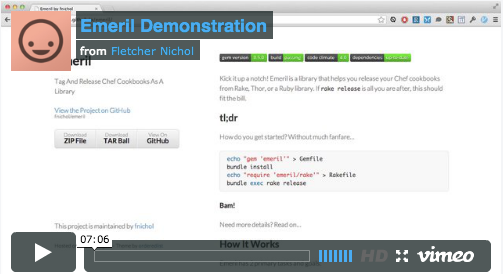Kick it up a notch! Emeril is a library that helps you release your Chef
cookbooks from Rake, Thor, or a Ruby library. If rake release is all you
are after, this should fit the bill.
How do you get started? Without much fanfare…
echo "gem 'emeril'" > Gemfile
bundle install
echo "require 'emeril/rake'" > Rakefile
bundle exec rake releaseBam!
Need more details? Read on…
Here is a short screencast demonstating how Emeril can be used to release a cookbook to the Community Site.
Emeril has 2 primary tasks and goals:
- Tag a Git commit with a semantic version tag with the form
"v1.2.5"(by default) - Optionally publish a versioned release of the cookbook to the Community Site
The Git tagging is currently accomplished via shell out, so Git must be installed on your system.
In order to bypass the deeply coupled cookbook_path assumptions that exist
in the Knife plugins, the publishing task (implemented by the
Publisher class) will create a temporary sandboxed copy
of the primary cookbook files for use by the
CookbookSiteShare Knife plugin. The following files are
considered production cookbook files:
README.*CHANGELOG.*metadata.{json,rb}attributes/**/*definitions/**/*files/**/*libraries/**/*providers/**/*recipes/**/*resources/**/*templates/**/*
If the above list seems incomplete or incorrect, please submit an issue.
Add this line to your application's Gemfile:
gem 'emeril'And then execute:
bundleOr install it yourself as:
gem install emerilEmeril currently uses the CookbookSiteShare to do most of the heavy lifting, so you will need a minimally configured knife.rb file with some required attributes set.
There are 2 configuration items you need:
- Your Community Site username, chosen at signup time.
- The file path to your Community Site user certificate.
When you sign up to the Community Site, the site will provide this key to
you as a
*.pemfile.
The easiest way to get setup is to add both of these items to your default
knife.rb file located at $HOME/.chef/knife.rb. If you are setting this
file up for the first time, give this a go (substituting your username, and
key location):
mkdir -p $HOME/.chef
cat <<KNIFE_RB > $HOME/.chef/knife.rb
node_name "fnichol"
client_key File.expand_path('~/.chef/fnichol.pem')
KNIFE_RBTo add the default Rake task (rake release), add the following to your
Rakefile:
require 'emeril/rake'If you need to further customize the Emeril::Releaser object you can use
the more explicit format with a block:
require 'emeril/rake_tasks'
Emeril::RakeTasks.new do |t|
# turn on debug logging
t.config[:logger].level = :debug
# disable git tag prefix string
t.config[:tag_prefix] = false
# set a category for this cookbook
t.config[:category] = "Applications"
endIf your cookbook is not on the Community Site, you can skip the publishing step with the block form:
require 'emeril/rake_tasks'
Emeril::RakeTasks.new do |t|
t.config[:publish_to_community] = false
endTo add the default Thor task (thor emeril:release), add the following to your
Thorfile:
require 'emeril/thor'If you need to further customize the Emeril::Releaser object you can use
the more explicit format with a block:
require 'emeril/thor_tasks'
Emeril::ThorTasks.new do |t|
# turn on debug logging
t.config[:logger].level = :debug
# disable git tag prefix string
t.config[:tag_prefix] = false
# set a category for this cookbook
t.config[:category] = "Applications"
endIf your cookbook is not on the Community Site, you can skip the publishing step with the block form:
require 'emeril/thor_tasks'
Emeril::ThorTasks.new do |t|
t.config[:publish_to_community] = false
endThe Ruby API is fairly straight forward, but keep in mind that loading or
populating Chef::Config[:node_name] and Chef::Config[:client_key] is
the responsibility of the caller, not Emeril.
For example, to load configuration from knife.rb and invoke the same code as the default Rake and Thor tasks, use the following:
# Populate Chef::Config from knife.rb
require 'chef/knife'
Chef::Knife.new.configure_chef
# Perform the git tagging and share to the Community Site
require 'emeril'
Emeril::Releaser.new(logger: Chef::Log).run- "Why doesn't Emeril automatically bump version numbers?" Emeril assumes that you are using a Semantic Versioning scheme for your cookbooks. Consequently it is very hard to determine what the next version number should be when this number is coupled to the changes accompanying the release. The next release could contain a bug fix, a new feature, or contain a backwards incompatible change--all of which have a bearing on the version number.
- "Okay, what if I supplied the version number, couldn't Emeril help me then?" Perhaps, but don't forget the other essential release artifact: a project changelog. While the maintenance schedule of the changelog is up to each author, it is sometimes desirable to combine the version bump and changelog items in one git commit. Emeril will tag and release your cookbook based on the last Git commit which is presumably your version-bump-and-changelog commit.
- "How do I change the category for my cookbook?" Emeril will maintain
the category used on the Community Site across releases. By default, new
cookbooks will be put in the
"Other"category. For now you can change the category directly on the Community Site, done! Otherwise, check out the Rake and Thor sections for further configuration help. - "Why is Emeril complaining that I'm missing the name attribute in my metadata.rb?" You want to set this name attribute. It unambiguously sets the name of the cookbook and not the directory name that happens to contain the cookbook code. Modern tools such as Berkshelf require this for dependency resolution and the Foodcritic cookbook linting tool has rule FC045 to help catch this omission.
- knife-community - a more complete, workflow-enabled tool by Mike Fiedler.
- knife community site share - with some extra/manual git tagging, correct directory structure, and workflow. Ships with the Chef gem.
- Source hosted at GitHub
- Report issues/questions/feature requests on GitHub Issues
Pull requests are very welcome! Make sure your patches are well tested. Ideally create a topic branch for every separate change you make. For example:
- Fork the repo
- Create your feature branch (
git checkout -b my-new-feature) - Commit your changes (
git commit -am 'Added some feature') - Push to the branch (
git push origin my-new-feature) - Create new Pull Request
Created and maintained by Fletcher Nichol (fnichol@nichol.ca)
MIT (see LICENSE.txt)




